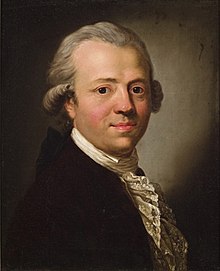This article includes a list of general references, but it lacks sufficient corresponding inline citations. (March 2012) |
Christoph Friedrich Nicolai (18 March 1733 – 11 January 1811) was a German writer, bookseller, critic, and regional historian, who authored satirical novels and travelogues.[1]

Life
editNicolai was born in Berlin, where his father, Christoph Gottlieb Nicolai (d. 1752), was the founder of the bookseller Nicolaische Buchhandlung. He received a good education, and in 1749 went to Frankfurt (Oder) to learn his father's business, finding time also to become acquainted with English literature.[2]
In 1752 Nicolai returned to Berlin, and began to take part in literary controversy by defending John Milton against the attacks of JC Gottsched. His Briefe über den jetzigen Zustand der schönen Wissenschaften in Deutschland, published anonymously in 1755 and reprinted by G Ellinger in 1894, were directed against both Gottsched and Gottsched's Swiss opponents, Johann Jakob Bodmer and Johann Jakob Breitinger; his enthusiasm for English literature won for him the friendship of Gotthold Ephraim Lessing and Moses Mendelssohn. In association with Mendelssohn he established in 1757 the Bibliothek der schönen Wissenschaften, a periodical which he conducted until 1760. Together with Lessing and Mendelssohn, Nicolai edited the famous book review journal Briefe, die neueste Literatur betreffend between 1759 and 1765; and from 1765 to 1792 he edited another book review journal Allgemeine deutsche Bibliothek. This latter periodical served as the organ of the so-called popular philosophers, who warred against authority in religion and against what they conceived to be extravagance in literature.[2]
His romances are largely forgotten, although Das Leben und die Meinungen des Herrn Magister Sebaldus Nothanker (1773–1776), and his satire on Goethe's Werther, Freuden des jungen Werthers (1775), had a certain reputation in their day. According to the Encyclopædia Britannica Eleventh Edition, his Anekdoten von König Friedrich II. von Preussen (1788–92), an account of events in the court of Frederick II the Great, has some historical value. Between 1788 and 1796, Nicolai published in twelve volumes a Beschreibung einer Reise durch Deutschland und die Schweiz, which bears witness to the conservatism of his views in later life.[2] The sober narrow-mindedness and grumpy stubbornness of the aging writer, who willingly pretended to be Lessing's spiritual heir, eventually led to the fact that his true merits were forgotten.[citation needed]
Nicolai also offered an early account of visual hallucinosis with preservation of insight and unrelated to madness:[3] "suddenly I observed, at the distance of ten paces, the figure of a deceased person. I asked my wife whether she saw it. She saw nothing but being much alarmed … sent for the physician." The visions were beyond his control and could not be elicited at will.[4] In a short story by Wilkie Collins entitled "Mrs. Zant and the Ghost," the narrator compares the main character to the "celebrated case of the bookseller, Nicolai, of Berlin" in regards to illusions "without being accompanied by derangement of the intellectual powers."[5]
Nicolai died in 1811 in Berlin.
Nicolai's Bildniss und Selbsbiographie was published by Moses Samuel Löwe in the Bildnisse jetzt lebender Berliner Gelehrter, in 1806.
References
edit- ^ Howard Serwer, ed. (2002). "Nicolai, (Christoph) Friedrich". Grove Music Online. Oxford University Press. doi:10.1093/gmo/9781561592630.article.19882.
- ^ a b c Chisholm 1911.
- ^ Berrios GE & Marková IS (2015) Visual hallucinations: history and context of current research. In Collerton D, Mosimann UP and Perry E (eds.) The Neuroscience of Visual Hallucinations. London: John Wiley & Sons, pp3-22.
- ^ Nicolai F ( 1799) Beispiel einer Erscheinung mehrerer Phantasmen; nebst einigen erlauternden Anmerkungen. Neue berlinische Monatsschrift, 2: 321-359.
- ^ Wilkie Collins (2006) The Haunted Hotel & Other Stories: Tales of Mystery & the Supernatural. "Mrs Zant & the Ghost". Hertfordshire: Wordsworth Editions Limited, pp 173-203.
- This article incorporates text from a publication now in the public domain: Chisholm, Hugh, ed. (1911). "Nicolai, Christoph Friedrich". Encyclopædia Britannica. Vol. 19 (11th ed.). Cambridge University Press. p. 662.
Further reading
edit- Leopold Friedrich Günther von Goeckingk, Friedrich Nicolais Leben und literarischer Nachlass (1820)
- Jakob Minor, Lessings Jugendfreunde, in Joseph Kürschner's Deutsche Nationalliteratur, vol. lxxii. (1883)
- Otto Hoffmann, Herders Briefwechsel mit Nicolai (1887)
- Ernst Friedel, Zur Geschichte der Nicolaischen Buchhandlung und des Hauses Brüderstraße 13 in Berlin (1891)
- Ernst Altenkrüger, Friedrich Nicolais Jugendschriften (1894)
- Pamela E. Selwyn, Everyday Life in the German Book Trade: Friedrich Nicolai as Bookseller and Publisher in the Age of Enlightenment, Penn State Press, 2010.
External links
edit- Media related to Friedrich Nicolai at Wikimedia Commons